Work Begins To Permanently Secure Low Level Nuclear Waste Vaults
16th November 2023
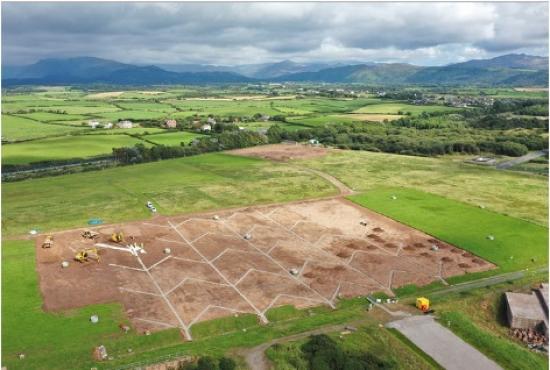
A key programme of work at the Low Level Waste Repository in Cumbria is making real progress.
The Repository, which is part of Nuclear Waste Services (NWS) and manages disposal of the UK's low level radioactive waste, has started key work on the final capping of historic trenches and vaults which are now full and ready for permanent closure.
Disposal of low level radioactive waste began in 1959 with waste being tipped into lined trenches at the Repository site near Drigg, Cumbria. Disposal techniques evolved during the late 1980s and early 1990s through the construction of highly engineered concrete vaults. This resulted in a modern, innovative approach to the treatment and safe disposal of low level nuclear waste in specially designed metal containers, which was placed in engineered vaults at the Repository site
A long-term programme is now underway to permanently close the existing vaults and adjacent trenches - and initial work on the ground has now begun. This work is key to Nuclear Waste Service's mission to make nuclear waste permanently safe, sooner, which is vitally important to the UK and future generations.
The UK has been producing and managing nuclear waste for many decades and will continue to do so for many more. Today, nuclear power is viewed by the UK Government as essential to the low-carbon energy mix and securing our energy supply in the future. The Welsh Government also supports nuclear new build. Therefore, the ability to safely manage and dispose of nuclear waste today and for future generations is crucial.
The project (Capping Operations) is a significant scope of work both in terms of scale and complexity. The initial work of the Capping Operations is now progressing, and will take five years. This first phase, Southern Trench Cap Interim Membrane (STIM) project, will see a replacement membrane put in place over some of the trenches to continue to protect the waste and will remain in place for up to 100 years.
Mike Pigott, Director of Sites and Operations for NWS, said, "The Low Level Waste Repository is an important national asset and is critical to delivering the Nuclear Waste Services mission. I am pleased we're progressing work on this long-term project with work commencing on site for this phase, it is vitally important that NWS caps the existing vaults and trenches to provide long-term protection to the wastes and the environment for generations to come.
We're making good progress on the project with a cap design agreed, infrastructure in place to deliver this work and permission to build the cap has been granted by the local authority. We will continue to work with our community to maintain our social licence to operate and are committed to being a considerate neighbour whilst delivering our important mission.
NWS has been engaging with the local community with drop-in sessions and site tours to share more details about what residents will see and hear over the next six to twelve months of operations. Plans are in place to mitigate and minimise any associated noise, dust, traffic, ecological and visual impacts. For example, through the installation of noise barriers and visual screening bunds, regular noise monitoring of activities and a commitment to bring the majority of aggregate and materials to the site via rail. NWS will continue its commitment to proactively engage the local community.
NWS is currently engaging with the supply chain to select the contractor for the next phase of the project, which is planned to be phased over four years and expected to commence late in 2024.
NWS is a core part of the Nuclear Decommissioning Authority (NDA) group, which is responsible for keeping the UK’s former nuclear sites and facilities safe and secure as they are decommissioned.
Most radioactive waste arising in the UK is Low Level (LLW) or Very Low Level (VLLW). Nuclear Waste Services delivers solutions for this waste, including at the Low Level Waste Repository (LLWR), as a valuable but finite resource for low level waste disposal.
The Low Level Waste Repository in Cumbria is the UK’s primary LLW disposal facility. This nuclear licensed site enables the safe, secure, and environmentally compliant effective management of low level waste materials needing disposal in engineered vaults.
In the last decade low level and intermediate level waste has been dealt with more sustainably, protecting the remaining disposal vault capacity available. Alternative options such as re-use, recycling, decontamination, incineration, and specialised landfill, (for waste with the very lowest levels of radioactivity), are now preferred with disposal at the Repository site seen as a last resort.
Related Businesses
Related Articles
TAE Technologies and UKAEA partner to commercialise fusion tech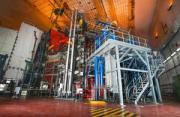
Joint venture to develop neutral beams for fusion and non-fusion applications, creating high-skilled jobs and establishing a critical supply chain. TAE Technologies, a leading US private fusion energy firm with over 25 years at the forefront of scientific innovation, today announces a bilateral and reciprocal investment commitment with the United Kingdom's national fusion laboratory, the UK Atomic Energy Authority (UKAEA) to commercialise TAE's proprietary particle accelerator technology for the global market.
Buried Hazards, Unfinished Business - What the NDA's 2025 Progress Report Really Tells Us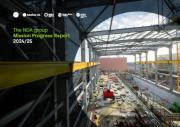
The Nuclear Decommissioning Authority (NDA) has released its 2025 Mission Progress Report is a slightly sprawling document chronicling one of the UK's most complex environmental undertakings. The safe dismantling of its early nuclear legacy.
New recruit officers join the Civil Nuclear Constabulary
The Civil Nuclear Constabulary (CNC) welcomes its newest recruits. The CNC hosted two passing out parades for the graduating Authorised Firearms Officers (AFOs) of Initial Foundation Programme (IFP) 106.
Dounreay's next generation of talent honoured by apprentice award
Nuclear Restoration Services Dounreay's Kate Thomson has won Modern Apprentice of the Year at the Highlands & Islands Apprenticeship Awards in Inverness. Kate, who is in the second year of her apprenticeship in commercial and quantity surveying, said she was thrilled by the honour.
Taskforce calls for radical reset of nuclear regulation in UK
Nuclear Regulatory Taskforce publishes final report and calls for radical reset of overly complex nuclear regulatory system. An overly complex nuclear regulatory system has contributed to the "relative decline" of the UK's ability to deliver faster and cheaper nuclear projects.
NDA working with private developer to accelerate Chapelcross Hub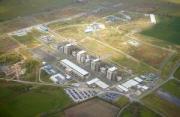
The NDA group has announced it's working with CX Power as the strategic developer to support the delivery of the green energy hub masterplan at Chapelcross. The Nuclear Decommissioning Authority (NDA) group has announced it's working with CX Power as the strategic developer to support the delivery of the green energy hub masterplan at Chapelcross, a programme set to transform the region.
Funding approved for Wick Harbour port consultant
A specialist ports consultant has been appointed to develop a long-term strategic plan for Wick Harbour Authority (WHA) in Caithness. WHA has secured £47,775 from Highlands and Islands Enterprise (HIE) and the Nuclear Restoration Services, NRS Dounreay towards the cost of the services.
NDA announces £1 million funding to accelerate clean energy in West Cumbria
NDA announces £1 million investment to develop masterplan for clean energy development on land adjacent to Sellafield. The Nuclear Decommissioning Authority (NDA) has announced today it's investing £1 million of funding to develop the masterplan for a clean energy development on land adjacent to Sellafield, known as Pioneer Park.Fallon Campbell From Melvich Near Thurso Named As Apprentice of the Year At Awards In London
Rising star from North Scotland honoured at event to celebrate brightest and best in industry. An electrical apprentice from North Scotland is celebrating after being recognised for her contribution to industry at the 13th annual Engineering Construction Industry ECI Training and Development Awards in London.
The NDA Group Graduate Programme: more than a job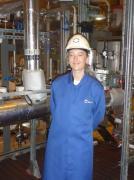
The NDA group graduate scheme offers far more than just a stepping stone into the nuclear industry; it's a chance to grow professionally, explore new places, and become part of a supportive community. Nuala Ledward, Assurance and Performance Graduate, shares how her secondment to Dounreay brought these benefits to life.
